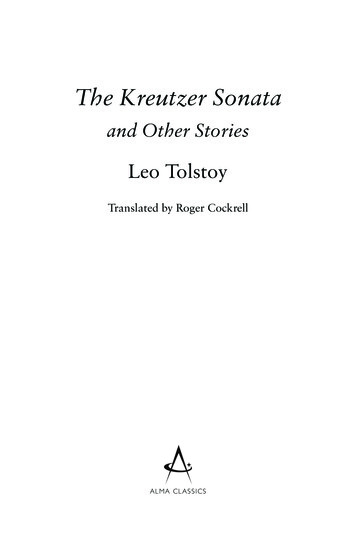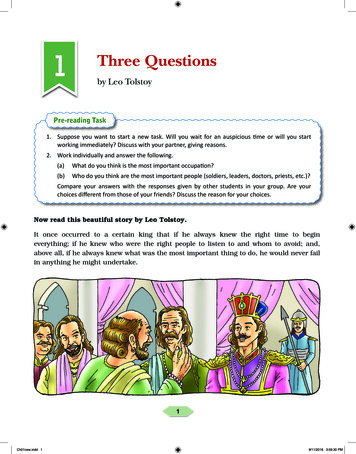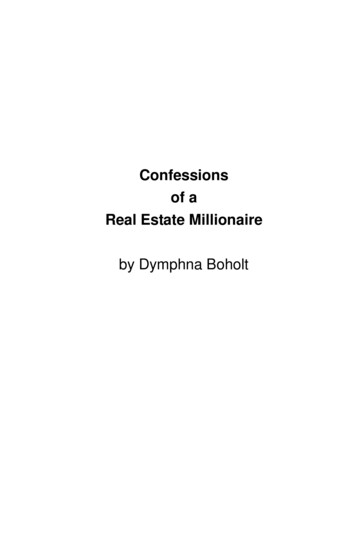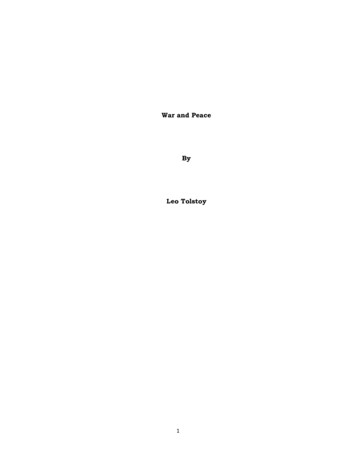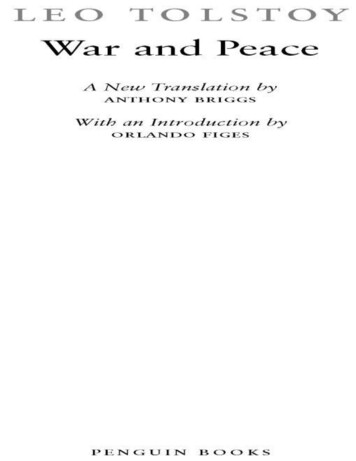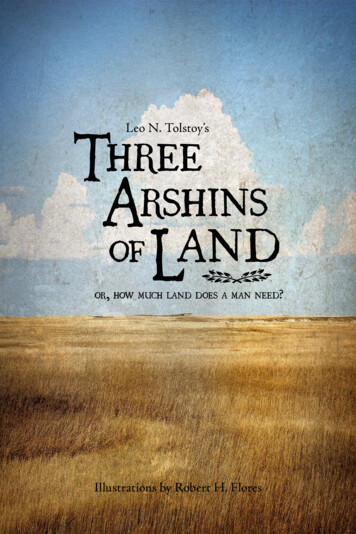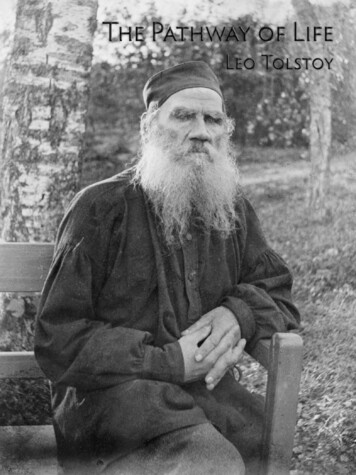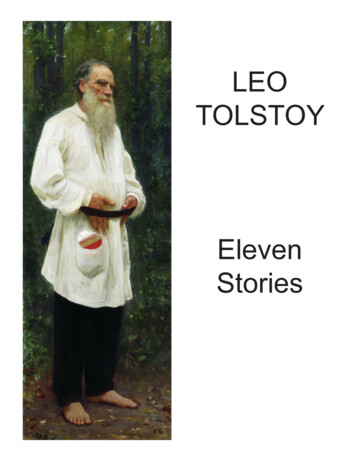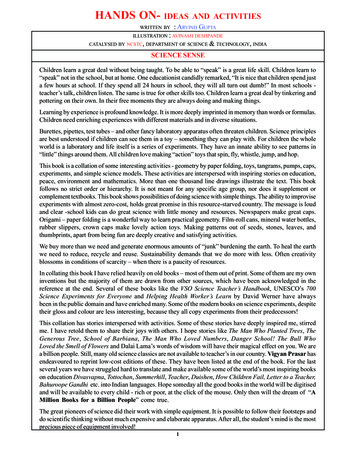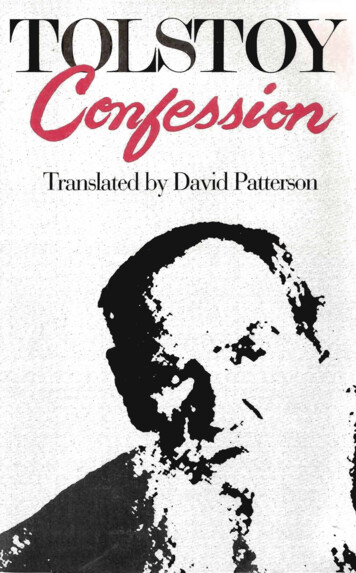
Transcription
ConfessionLEO TOLSTOYTranslation and Introduction byDAVID PATTERSONW WNORTONNEW YORK&COMPANYLONDON
Copyright @)1983 by David Patterson. All rights reserved.Printed in the United States of America.The text of this book is composed in photocomposition Avanta, with display type setin Centaur. Composition by The Haddon Craftsmen, Inc. Manufacturing by TheMurray Printing Company. Book design by Marjorie]. Flock.This is a translation of Ispoved' as it appears in Tolstoy'S Polnoe sobraniesochinenii, volume 23 (Moscow, 1957), to which acknowledgment is made.Library of Congress Cataloging in Publication DataTolstoy, Leo, graf, 1828-1910.ConfessionTranslation of: Ispoved'Bibliography: p.Christian life.graf, 1828-1910.BV450l.T64 1983ISBN2. Faith.3. Tolstoy, Leo,I. Patterson, David.201II. Title.83-24140-393-30192-3w. W. Norton & Company, Inc. 500 Fifth Avenue, New York, N. . 10110W. W. Norton & Company Ltd., 10 Coptic Street, London, WCIA IPU
INTRODUCTIONNTHE FALL of 1879 the fifty-one-year-old author of Warand Peace (1869) and Anna Karenina (1877) came to believethat he had accomplished nothing in life and that his life wasmeaningless. Either of these works would have assured him apermanent place in the annals of world literature; both testifiedto the depth of his genius and creativity. If artistic achievementof this magnitude cannot instill life with meaning, th en where ismeaning to be found? Such is the "question of life" that Tolstoyaddresses in his Confession, a question as timeless as the spirit.Ernest J. Simmons has described the Confession as "one ofthe noblest and most courageous utterances of man, theoutpour ings of a soul perplexed in the extreme by life's great problem the relation of man to the infinite-yet executed with completesincerity and high art."* It is a tale of midlife spiritual crisis, theingredients of which had been fermenting in the man since hisyouth. As such, the Confession marks a turning point in Tolstoy'sconcern as an author, and after 1880 his attention was concen trated quite explicitly and almost exclusively on the religious lifethat he believed to be idealized in the peasant.Although there are parallels between the torments of Levinin Anna Karenina and Tolstoy's own conflicts in the Canfession,I*Ernest 1. Simmons,Leo Tolstoy(Boston: Little, Brown and Co., 1946), p. 326.5
I N TRO D U C TIO Nthe latter was written two years after the publication of the formerand represents a more developed reflection on the question of life'smeaning and the problems surrounding faith; indeed, these areprecisely the difficulties that confront many of the characters inhis later fiction, including the title characters in The Death of IvanIl'ich (1886) and Father Sergius (1896), as well as Brekhunov inMaster and Man (1895) and Nekhlyudov in Resurrection (1900).After completing Anna Karenina Tolstoy attempted to do a fewidyllic sketches of peasant life, but his preoccupation with faith,death, and the meaning of life made it difficult for him to writeat all.By the end of 1877 Tolstoy was deeply entrenched in theconflict between faith and reason. During the winter of 1877-78,for example, he did some work on two pieces entitled A Debateon Faith in the Kremlin and The Interlocutors in which he setforth discussions of faith between believers and nonbelievers. Hethen put these projects aside to begin research for a sequel to Warand Peace called The Decembrists, but his work on the new novelwas interrupted for over a month in the summer of 1878 when hewent on a religious retreat to Samara in southern Russia. Shortlyafter he returned home on 3 August he reconciled a feud withTurgenev that had lasted for seventeen years. In February of 1 879 ,however, he ceased work on The Decembrists altogether and with out explanation .Tolstoy believed that one of the eternal questions for everyperson is the extent to which he serves God or mammon. It waswith this question in mind that he began preparations for stillanother novel, this one entitled One Hundred Years. The newwork was to be about Peter the Great, but by the summer of 1879Tolstoy felt he did not have the strength to continue the project.On 14 June he went on still another religious retreat, this time to6
I N TRO D U C TIO Nthe Cave Monastery in Kiev, where he found simple monks livingtheir lives in keeping with the "ancient Christian ways. " The tripto Kiev revitalized his spirit so much that he now had the strengthto break completely with the Orthodox Church, whereupon he setout to show that the teachings of the Church were not at allconsistent with the Gospel. To be ure, the Confession was origi nally subtitled An Introduction to an Unpublished Work, thatwork being An Investigation of Dogmatic Theology, in whichTolstoy undertook one of his several attacks on the Church.After completing a rough draft of the Confession at the endof 1879, Tolstoy revised it by drawing on material from his incom plete autobiographical essay, "What Am I?" The Confession wassupposed to have appeared in 1882 in an issue of Russkaya mysl',but due to difficulties with the censor it did not appear until 1884,when it was published in Geneva. It should be noted that the piecedid not bear the title Confession until it came out in the Genevaedition.In order to show what the censor found so objectionableabout the Confession, it may be helpful to reproduce here the firstpage from the Geneva edition, which was supposed to have servedas an introduction to the aborted Russian edition:"In this work by Count L. N. Tolstoy, which we are publish ing here, there unfolds before the reader the internal drama of amighty soul in all its depth and profundity, with all its terrible andtragic turmoil. This is a soul gifted with a wealth of creative power,striving since his earliest years toward self-perfection; but he is alsoa soul educated in surroundings where everyone lives according tohis basic origins, which not only have nothing to do with theteachings of doctrine but for the most part are in opposition tothem-'wherever the teachings of doctrine exist: formally ndcoldly taught, 'supported by force, those teachings are not part of7
I N TRO D U C TIONthe life of the people and the relations among them.'"Here unfolds the drama of a soul who has sought from hisearliest years the path to truth, or as the author refers to it, 'themeaning of life.' This is a soul striving with all the strength of hisinner energy toward the light which shapes him and his edifica tion; he strives no less by means of a scientifically cold, rational,abstract investigation that ultimately leads to God and divinetruth. It is truly a magnificent drama for anyone whose living soulhas the power to understand and perceive its inner meaning; it iswritten by the hand of one who himself lived through all itsinternal collisions, torments and agonies, by the hand of our ingen ious writer. Under such circumstances whatever one might sayabout this work would seem superfluous. Nevertheless, we wish towarn the reader not to make the mistake which is so easily madeby anyone who picks up a new publication, whether it deals withheartless nature or with the spirit, which is the realm of literature.The mistake stems from the manner in which the reader treats thework, the way he approaches it and the things he demands fromit. Nothing of that sort should distort the author's thoughts; noth ing should pervert or obscure the true meaning of his ,work, suchas our preconceptions according to which we may view the workwhenever we enter i t with arbitrary questions which the authordoes not wish to answer and with which he did not think toconcern himself."*Finally, it may be asked whether Tolstoy ever actually foundthe meaning of life or the truth he sought. Whatever is said inthis regard, it is clear that he continued his search until his deathin 1910: his was a life characterized as much by seeking as byfinding. Indeed, the meaning he was striving for reveals itself more*Translated from N. N. Gusev,P·593·8Lev Nikolaevich Tolstoy,vol. 3 (Moscow, 1963),
I N T R O D U C TIO Nin the search than in the discovery, and asking the question of lifeis more vital than answering it. For it is by raising the questionthat the spirit engages in its struggle for voice, a struggle that findsits expression in works such as the Confession.
wIJAS BAPTIZED and educated in the Orthodox Christianfaith. Even as a child and throughout my adolescence andyouth I was schooled in the Orthodox beliefs. But when atthe age of eighteen I left my second year of studies at the univer sity, * I had lost all belief in what I had been taught.Judging from what I can remember, I never really had aserious belief. I simply trusted in what I had been taught and inthe things my elders adhered to. But even this trust was very shaky.I remember that when I was eleven years old a high-schoolboy named Volodin'ka M . , now long since dead, visited us oneSunday with an announcement of the latest discovery made atschoQI. The discovery was that there is no God and that the thingsthey were teaching us were nothing but fairy tales (this was in1838). t I remember how this news captured the interest of myolder brothers; they even let me in on their discussions. I remem ber that we were all very excited and that we took this news tobe both quite engaging and entirely possible.I also remember the time when my older brother Dmitri, whowas then at the university, suddenly gave hi self over to faith with*On 12. April 1847 Tolstoy asked permission to withdraw from the University ofKazan for health reasons. Shortly afterward he returned to the Tolstoy estate atYasnaya Polyana 130 miles from Moscow.tOn 2.5 May of this year Tolstoy's grandmother died. Her passing filled him withhorror and left him preoccupied with death for months afterward.13
CONFESSIONall the passion that is peculiar to his nature; he began to attendall the church services, to fast, and to lead a pure and moral life.All of us, including those who were older, continually subjectedhim to ridicule, and for some reason we gave him the nicknameof Noah . I remember that when Musin-Pushkin, then a trustee ofthe University of Kazan, invited us to a ball, my brother declinedthe invitation; Musin-Pushkin, with a certain mockery, tried topersuade him to come by saying that even David danced beforethe ark. At that time I sympathized with these jokes from myelders, and they led me to the conclusion that I had to learn mycatechism and go to church but that it was not necessary to takeit all too seriously. I also remember reading Voltaire* when I wasvery young; not only was I not disgusted with his mockery, but Iactually found it quite amusing.My break with faith occurred in me as it did and still doesamong people of our social and cultural type. As I see it, in mostcases it happens like this: people live as everyone lives, but theyall live according to principles that not only have nothing to dowith the teachings of faith but for the most part are contrary tothem. The teachings of faith have no place in life and never comeinto play in the relations among people; they simply play no rolein living life itself. The teachings of faith are left to some otherrealm, separated from life and independent of it. If one shouldencounter them, then it is only as some superficial phenomenonthat has no connection with life.Today, as in days past, there is no way to tell from a person'slife, from his deeds, whether or not he is a believer. If there is*Fran ois Marie Arouet de Voltaire ( 1694-1778) was a French philosopher, dram atist, essayist, poet, historian, and satirist. A center of controversy throughout hislife, he became the spokesman for the anticlerical and rationalist ideas of the Ageof'Enlightenment.
LEO TOLSTOYindeed no difference between those who are clearly adherents ofthe Orthodox faith and those who deny it, then it is not to thebenefit of the former. Then, as now, the open avowal and confes sion of the Orthodox faith occurred largely among narrow minded, cruel, and immoral people wrapped up in their ownself-importance. On the other hand, intellect, honor, straightfor wardness, good naturedness, and morality were for the most partto be found among people claiming to be disbelievers.They teach catechism in the schools and send pupils tochurch; functionaries must carry certificates showing they havetaken holy communion. But now, and even more so in the past,a person of our class who is no longer in school and has not goneinto public service can live dozens of years without once beingreminded that he lives among Christians, while he himself isregarded as a follower of the Orthodox Christian faith.Thus to,day, as in days past, the teachings of faith, acceptedon trust and sustained by external pressure, gradually fade underthe influence of the knowledge and experiences of life, whichstand in opposition to those teachings. Quite often a man goes onfor years imagining that the religious teaching that had beenimparted to him since childhood is still intact, while all the timethere is not a trace of it left in him.A certain intelligent and honest man named S. once told methe story of how he ceased to be a believer. At the age of twenty six, while'taking shelter for the night during a hunting trip, heknelt to pray in the evening, as had been his custom since child hood. His older brother, who had accompanied him on the trip,was lying down on some straw and watching him. When S. hadfinished and was getting ready to lie down, his brother said to him,"So you still do that. " And they said nothing more to each other.From that day S. gave up praying and going to church. And for15
CONFESSIONthirty years he has not prayed, he has not taken holy communion,and he has not gone to church. Not because he shared his brother'sconvictions and went along with them; nor was it because he haddecided on something or other in his own soul. It was simply-thatthe remark his brother had made was like the nudge of a fingeragainst a wall that was about to fall over from its own weight. Hisbrother's remark showed him that the place where he thoughtfaith to be had long since been empty; subsequently the words hespoke, the signs of the cross he made, and the bowing of his headin prayer were in essence completely meaningless actions. Oncehaving admitted the meaninglessness of these gestures, he couldno longer continue them.Thus it has happened and continues to happen, I believe,with the great majority of people. I am referring to people of oursocial and cultural type, people who are honest with themselves,and not those who use faith as a means of obtaining some temporalgoal or other. (These people are the most radical disbelievers, forif faith, in their view, is a means of obtaining some worldly end,then it is indeed no faith at all.) People of our type are in a positionwhere the light of knowledge and of life has broken down theartificial structure, and they have either taken note of this andhave left it behind them or they have remained unconscious of it.The teachings of faith instilled in me since childhood left me,just as they have left others; the only difference is that since Ibegan reading and thinking a great deal at an early age, I becameaware of my renunciation of the teachings of faith very early inlife. From the age of sixteen I gave up praying and on my ownaccord quit going to church and fasting. I ceased to believe in whathad been instilled in me since childhood, yet I did believe insomething, though I could not say what. I even believed in God-or rather I did not deny God-but what kind of God I couldnot say; nor did I deny Christ and his teachings, but I could not
LEO TOLSTOYhave said what those teachings consisted of.As I now look back at that time I clearly see that apart fromanimal instincts, the faith that affected my life, the only real faithI had, was faith in perfection. But I could not have said whatperfection consisted of or what its purpose might be. I tried toachieve intellectual perfection; I studied everything I could, every thing that life gave me a chance to study. I tried to perfect mywill and set up rules for myself that I endeavored to follow. I strovefor physical perfection by doing all the exercises that developstrength and agility and by undergoing all the hardships thatdiscipline the self in endurance and perseverance. I took all thisto be perfection. The starting point of it all was, of course, moralperfection, but this was soon replaced by a belief in overall perfec tion, that is, a desire to be better not in my own eyes or in theeyes of God, but rather a desire to be better in the eyes of otherpeople. And tqis effort to be better in the eyes of other people wasvery quickly displaced by a longing to be stronger than otherpeople, that is, more renowned, more important, wealthier thanothers.IISomeday I shall relate the story of my life, including both thepathetic and the instructive aspects of those ten years of my youth.I think that many, very many, have had the same experiences.With all my soul I longed to be good; but I was young, I hadpassions, and I was alone, utterly alone, whenever I sought whatwas good. Every time I tried to express my most heartfelt desiresto be morally good I met with contempt and ridicule; and as soonas I would give in to vile passions I was praised and encouraged.Ambition, love of power, self-interest, lechery, pride, anger, ven geance-all of it was highly esteemed. As I gave myself over to
CONFESSIONthese passions I became like my elders, and I felt that they werepleased with me. A kindhearted aunt of mine with whom I lived,one of the finest of women, was forever telling me that her fondestdesire was for me to have an affair with a married woman: "Rienne forme un ;eune homme comme une liaison avec une femmecomme il faut. ,,* Another happiness she wished for me was thatI become an adjutant, preferably to the emperor. And the greatesthappiness of all would be for me to marry a very wealthy younglady who could bring me as many serfs as possible.I cannot recall those years without horror, loathing, and heart rending pain. I killed people in war, challenged men to duels withthe purpose of killing them, and lost at cards; I squandered thefruits of the peasants' toil and then had them executed; I was afornicator and a cheat. Lying, stealing, promiscuity of every kind,drunkenness, violence, murder-there was not a crime I did notcommit; yet in spite of it all I was praised, and my colleaguesconsidered me and still do consider me a relatively moral man.Thus I lived for ten years.During this time I began to write out of vanity, self-interest,and pride. I did the same thing in my writing that I did in my life.In order to acquire the fame and the money I was writing for, itwas necessary to conceal what was good and to flaunt what wasbad. And that is what I did. Time after time I would scheme inmy writings to conceal under the mask of indifference and evenpleasantry those yearnings for something good which gave mean ing to my life. And I succeeded in this and was praised.At the age of twenty-six, when the war had ended, t I cameto St. Petersburg and got to know the writers there. They acceptedme as one of their own, heaped flattery upon me. Before I could·"Nothing shapes a young man like a liaison with a decent woman."tThis was the Crimean War ( 185 3-56), in which England, France, Turkey, andSardinia combined forces to defeat Russia.
L E O TO L S TOYtum around, the views on life peculiar to the writers with whomI associated became my own, and before long all my previousefforts to become better were completely at an end. Having nodiscipline myself, I let these views justify my life.The theory adopted by these people, my fellow writers, wasthat life proceeds according to a general development and that we,the thinkers, play the primary role in that development; moreover,we, the artists and the poets, have the greatest influence on thethinkers. Our mission is to educate people. In order to avoid theobvi9US question-"What do I know and what can I teach?" the theory explained that it is not necessary to know anything andthat the artist and the poet teach unconsciously. Since I wasconsidered a remarkable artist and poet, it was quite natural forme to embrace this theory. As an artist and poet I wrote andtaught without myself knowing what I was teaching. I receivedmoney for doing this; I enjoyed excellent food, lodgings, women,society; I was famous. Therefore whatever I was teaching musthave been very good.This faith in knowledge, poetry, and the evolution of life wasindeed a faith, and I was one of its priests. Being one of its priestswas very profitable and quite pleasant. I lived a rather long timein this faith without ever doubting its truth. But in the second andespecially in the third year of such a way of life I began to doubtthe infallibility of this faith and started to examine it more closely.The first thing that led me to doubt was that I began to noticethat the priests of this faith did not agree among themselves. Somewould say, "We are the best and the most useful of teachers, forwe teach what is needful while others who teach are in error."Others would say, "No, we are the true teachers; it is you who arein error." They argued and quarreled among themselves andabused, deceived, and cheated one another. Moreover, there weremany among us who were not even concerned about who was right
C O N F E S S IO Nand who was wrong; they simply pursued their own selfish endsand had the support of our activity. All this forced me to doubtthe truth of our faith .Furthermore, once I had come to doubt the faith of thewriters, I began to observe its priests more closely and becameconvinced that nearly all the priests of this faith were immoralmen, in most cases of a base and worthless character. Many ofthem were lower than those whom I had met earlier during mywanton military life, but they were complacent and self-satisfiedto a degree that can only be found either among people who arecomplete saints or among those who do not know what holinessis. People became repugnant to me, and I became repugnant tomyself. And I realized that this faith was a delusion.But the strange thing is that even though I was quick to seethe utter lie of this faith and renounced it, I did not renounce therank bestowed upon me by these people, the rank of artist, poet,and teacher. I naively imagined that I was a poet and an artist, thatI could teach all men without myself knowing what I was teaching.And so I went on.As a result of my association with these people, I took up anew vice: I developed a pathological pride and the insane convic tion that it was my mission to teach people without knowing whatI was teaching them.As I now look back at that period and recall my state of mindand the state of mind of those people (a state that, by the way,persists among thousands ) , it all seems pitiful, horrible, and ridicu lous to me; it excites the same feelings one might experience ina madhouse.At the time we were all convinced that we had to speak, write,and publish as quickly as possible and as much as possible and thatthis was necessary for the good of mankind. Thousands of us20
LEO TOLSTOYpublished and wrote in an effort to teach others, all the whiledisclaiming and abusing one another. Without taking note of thefact that we knew nothing, that we did not know the answer tothe simplest question of life, the question of what is right and whatis wrong, we all went on talking without listening to one another.At times we would indulge and praise each other on the conditionthat we be indulged and praised in return; at other times we wouldirritate and shout at each other exactly as in a madhouse.Thousands of workers toiled day and night, to the limit oftheir strength, gathering and printing millions of words to bedistributed by mail throughout all Russia. We continued to teach,teach, and teach some more, and there was no way we could everteach it all; and then we would get angry because people paid uslittle heed.Very strange indeed, but now I understand it. The real reasonbehind what we were doing was that we wanted to obtain as muchmoney and praise as possible. Writing books and newspapers wasthe only thing we knew how to do in order to attain this end. Andso that.-i what we did. But in order for us to engage in somethingso useless and at the same time maintain the conviction that wewere very important people, we needed a rationale that wouldjustify what we were doing. And so we came up with the following:everything that exists is rational. Further, everythin that exists isevolving. And it is evolving by means of an enlightenment. Theenlightenment in turn undergoes change through the distributionof books and periodicals. We are paid and respected for writingbooks and periodicals, and therefore we are the most useful andthe best of people. This reasoning would have worked very well,had we all been in agreement; but since for every opinion ex pressed by one person there was always someone else whose opin ion was diametrically opposed to it, we should have been led to21
C O N F E S S IO Nreconsider. But we never noticed this. We received money, andpeople of our circle praised us; thus every one of us believedhimself to be right.It is now clear to me that there was no difference betweenourselves and people living in a madhouse; at the time I onlyvaguely suspected this, and, like all madmen, I thought everyoneexcept myself was mad.IIIThus I lived, giving myself over to this insanity for another sixyears, until my marriage. * During this time I went abroad. Lifein Europe and my acquaintance with eminent and learned Euro peans confirmed me all the more in my belief in general perfecti bility, for I found the very same belief among them. My beliefassumed a form that it commonly assumes among the educatedpeople of our time. This belief was expressed by the word "prog ress." At the time it seemed to me that this word had meaning.Like any living individual, I was tormented by questions of howto live better. I still had not understood that in answering that onemust live according to progress, I was talking just like a personbeing carried along in a boat by the waves and the wind; withoutreally answering, such a person replies to the only important ques tion-"Where are we to steer?"-by saying, "We are being car ried somewhere."I did not notice this at the time. Only now and then wouldmy feelings, and not my reason, revolt against this commonly heldsuperstition of the age, by means of which people hide fromthemselves their own ignorance of life. Thus during my stay in*On 23 September 1862, at the age of thirty-four, Tolstoy married eighteen-year old Sof'ya Andreevna Bers.22
L EO TO L S TOYParis the sight of an execution revealed to me the feebleness ofmy superstitious belief in progress. * When I saw how the head wassevered from the body and heard the thud of each part as it fellinto the box, I understood, not with my intellect but with mywhole being, that no theories of the rationality of existence or ofprogress could justify such an act; I realized that even if all thepeople in the world from the day of creation found this to benecessary according to whatever theory, I knew that it was notnecessary and that it was wrong. Therefore, my judgments mustbe based-on what is right and necessary and not on what peoplesay and do; I must judge not according to progress but accordingto my own heart. The death of my brother was another instancein which I realized the inadequacy of the superstition of progressin regard to life. t A good, intelligent, serious man, he was stillyoung when he fell ill. He suffered for over a year and died anagonizing death without ever understanding why he lived andunderstanding even less why he was dying. No theories couldprovide any answers to these questions, either for him or for me,during his slow and painful death.But these were only rare instances of doubt; on the whole Icontinued to live, embracing only a faith in progress. "Everythingis developing, and I am developing; the reason why I am develop ing in this way will come to light, along with everything else. "Thus I was led t o formulate my faith a t the time.When I returned from abroad I settled in the country and*On 25 March 1857 Franr;ois Riche was executed for murder. On 6 April Tolstoymentioned the execution in his diary: "He kissed the Gospel and then-- leath.What insanity'"tTolstoy's favorite brother, Nikolai, died of consumption on 20 September 1860at the age of thirty-seven. On 21 January 1856 his brother Dmitri died of the samedisease at the age of twenty-eight. Although Dmitri served as a model for Levin'sbrother in Anna Karenina ( 1877), here Tolstoy is probably referring to the deathof Nikolai.
C ON F E S S IONoccupied myself with the peasant schools. This occupation wasespecially dear to my heart because it involved none of the lies thathad become so apparent to me, the lies that had irritated me whenI was a literary teacher. Here too I was acting in the name ofprogress, but I assumed a critical attitude toward that progress. Itold myself that in many of its forms progress did not proceed asit should and that here it was necessary to leave a primitive people;the peasant children, completely free to choose the path of prog ress they wanted.In essence I was still faced with the same insoluble problemof how to teach without knowing what I was teaching. In thehigher spheres of literature it was clear to me that I could notteach without knowing what I was teaching; for I saw that every one taught differently and that in the arguments they had theyscarcely hid their ignorance from each other. But here, with thepeasant children, I thought I could get around this difficulty byallowing the children to learn whatever they liked. I t now seemslu
This is a translation of Ispoved' as it appears in Tolstoy'S Polnoe sobranie sochinenii, volume 23 (Moscow, 1957), to which acknowledgment is made. Library of Congress Cataloging in Publication Data Tolstoy, Leo, graf, 1828-1910. Confession Translation of: Ispoved' Bibliography: p. Christian life. 2. Faith. 3. To


